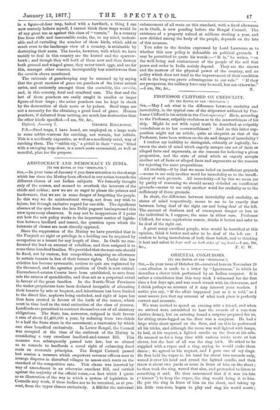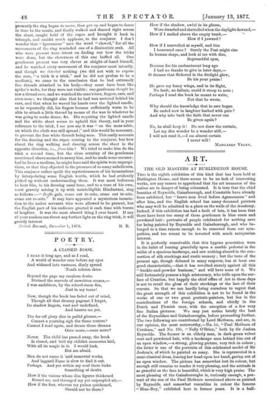ORIENTAL CONJURORS.
[TO THE EDITOR OF THE "SPECTATOR."] SIR,—In your issue of October 28—received hereon November 29 —an allusion is made to a letter by "Ignoramus," in which he describes a clever trick performed by an Indian conjuror. It is rather a coincidence that this very trick I witnessed for the first time a few days ago, and was much struck with its cleverness, and I think perhaps an account of it may interest your readers. I notice you say, " If the affair happened just as it is told," so I must assure you that my account of what took place is perfectly correct and accurate.
We were invited to spend an evening with a friend, and when we arrived were astonished to hear the sounds of a tom-tom (native drum), but on entering found a surprise prepared for us, for sitting cross-legged on the floor was a conjuror. He had a large white sheet spread on the floor, and on this be performed all his tricks, and although the room was well lighted with lamps, he had, at his request, a lighted candle on the floor at his side. He amused us for a long time with various tricks more or less clever, but the best of all was the ring trick. He asked to be supplied with a rupee and a ring, saying he would make them dance ; we agreed to his request, and I gave one of my rings. He first held the rupee in his hand for about two seconds only, waved it over his head and round the lighted candle, and then threw it about two yards or more in front of him on the sheet ; he then took the ring, waved that also, and pretended to listen to something it said. He then announced that if it was his fate (" kismet ") to keep the rupee, the ring would bring it to him. He put the ring in front of him on the sheet, and taking up his little tom-tom, began to play and sing his weird music ; presently the ring began to move, then got up and began to dance in time to the music, and finally walked and danced right across the sheet, caught hold of the rupee and brought it back in triumph, and amidst much applause, to the conjuror. I don't wonder that " Ignoramus " uses the word "clawed," for all the movements of the ring reminded one of a diminutive crab. All who were present were intent on finding out how the tricks were done, but the cleverness of this one baffled all. One gentleman present was very clever at sleight-of-hand himself, and he watched every movement of the conjuror most intently, and though we detected nothing (we did not wish to expose the man, " a trick is a trick," and he did not profess to be a medium), we came to the conclusion that he had extremely fine threads attached to his body—they must have been like spider's webs, for they were not visible ; one gentleman thought he saw a thread once, and we watched the man's toes, fingers, ears, and even nose ; we thought also that he had wax secreted behind his ears, and that when he waved his bands over the lighted candle, as he repeatedly did, his fingers became sufficiently warm to be able to attach a little thread by means of the wax to whatever he was going to make dance, &c. His requiring the lighted candle and the white sheet seems to uphold this theory, and in your reference to the trick, I see you say it was " on the mess-table, on which the cloth was still spread ;" and this would be necessary, to prevent the fine white threads being seen. This easily accounts for the dancing and the rupee coming to the conjuror, but bow about the ring walking and dancing across the sheet in the opposite direction, i.e., fronz him? We tried to make him do the trick a second time, but the close scrutiny of the gentleman mentioned above seemed to annoy him, and he made some excuses ; had he been a medium, he might have said the spirits were unpropi- tious, or that they objected to the presence of so many unbelievers. This conjuror rather spoilt the mysteriousness of his incantations by interpolating some English words, which he had evidently picked up without understanding them. It was most ludicrous to hear him, in his droning nasal tone, and to a tune of his own, most gravely mixing it up with unintelligible Hindustani, sing as follows :—"Bqllio gals, come out to -nite, come out to-nite, come out to-nite." It may have appeared a mysterious incanta- tion to the native servants who were allowed to be present, but the English part of his audience greeted it each time with bursts of laughter. It was the most absurd thing I ever heard. If any of your readers can throw any further light on the ring trick, it will greatly interest British Burmah, December 1, 1876. B. B.







































 Previous page
Previous page